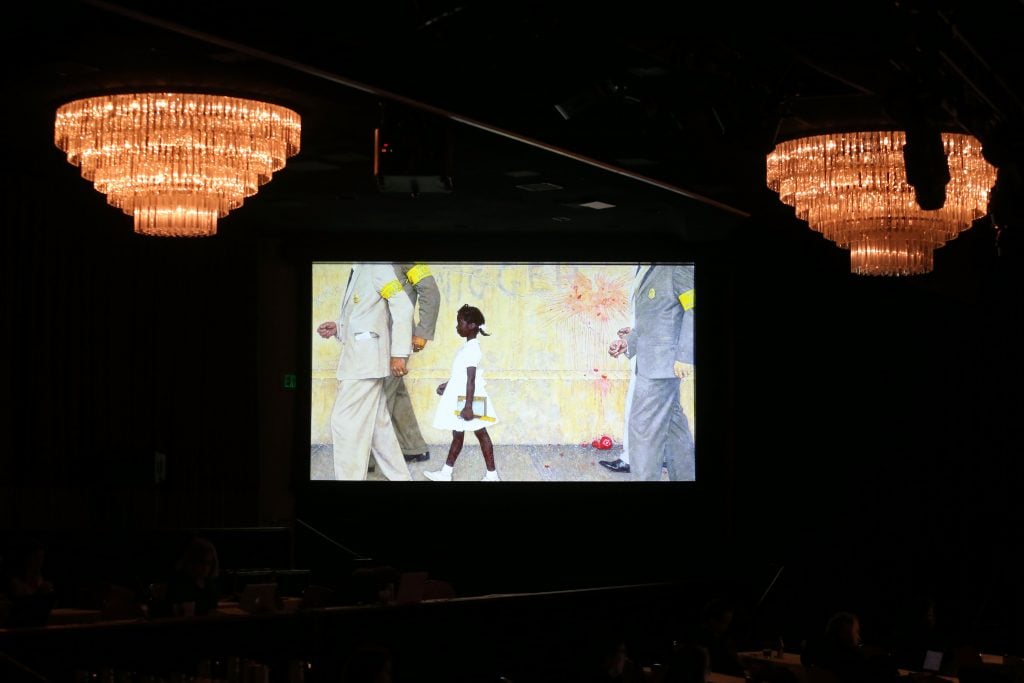- Norman Rockwell’s family has condemned DHS for using his art to promote anti-immigrant rhetoric on social media platforms.
- In an op-ed, they emphasized Rockwell’s anti-racist legacy, citing works like The Problem We All Live With and his evolving social conscience.
- DHS has previously misused art by Thomas Kinkade and John Gast, prompting broader criticism of its whitewashed historical messaging.
Norman Rockwell’s descendants are condemning the U.S. Department of Homeland Security (DHS) for misusing the artist’s work in its social media posts.
After DHS shared Rockwell reproductions across its X, Instagram, and Facebook accounts to promote its anti-immigrant rhetoric, Rockwell’s family [published](https://www.usatoday.com/story/opinion/voices/2025/11/02/no…
- Norman Rockwell’s family has condemned DHS for using his art to promote anti-immigrant rhetoric on social media platforms.
- In an op-ed, they emphasized Rockwell’s anti-racist legacy, citing works like The Problem We All Live With and his evolving social conscience.
- DHS has previously misused art by Thomas Kinkade and John Gast, prompting broader criticism of its whitewashed historical messaging.
Norman Rockwell’s descendants are condemning the U.S. Department of Homeland Security (DHS) for misusing the artist’s work in its social media posts.
After DHS shared Rockwell reproductions across its X, Instagram, and Facebook accounts to promote its anti-immigrant rhetoric, Rockwell’s family published a November 2 op-ed at USA Today to highlight the artist’s anti-racist efforts. “If Norman Rockwell were alive today, he would be devastated to see… that his own work has been marshaled for the cause of persecution toward immigrant communities and people of color,” they wrote.
The Rockwell family’s op-ed targets three recent posts by DHS. The first, from August 20, features Rockwell’s Salute the Flag (1971) with the caption, “Protect our American way of life.” The image features a mostly white audience in the conservative garb of the early to mid-20th century and suggests a diversity-free American populace. Another depicts Rockwell’s Working on the Statue of Liberty (1946) accompanied by a link viewers can visit in order to “BECOME A HOMELAND DEFENDER TODAY.” A month ago, DHS posted Rockwell’s painting of a boy typing up a story about Daniel Boone with an invocation to “Manifest Heroism.”
Online commenters swiftly came for the DHS. One comment on this final post reads “Manifest Deez Nutz.” Another person offered: “Norman Rockwell would have hated you bro.”

Norman Rockwell, The Problem We All Live With (1964) on view at the 2013 Summer Television Critics Association tour at the Beverly Hilton Hotel. Photo: Frederick M. Brown / Getty Images.
Rockwell’s family provides critical context on the artist’s work. His famous 1916–63 covers for The Saturday Evening Post did, in fact, mostly depict white people. These images made Rockwell famous. His name became synonymous with his realistic, at times humorous, illustration style, and his focus on American life and traditions. The boy scouts, a Thanksgiving table, Santa Claus, and soda counters appear throughout his oeuvre.
Yet the Civil Rights Movement profoundly affected Rockwell. In 1964, he contributed a now-famous painting to Look Magazine inspired by the struggles of Ruby Bridges, a Black child who desegregated her New Orleans school in 1960. The title, The Problem We All Live With, highlights the ubiquity of American racism and the country’s shared responsibility to confront it (the painting notably hung in the Obama White House for a few months).
Rockwell was 70 years old when he made the piece. He was remarkably open to the teachings of burgeoning social movements. Throughout the 1960s, the artist memorialized the murders of civil rights workers in Mississippi and celebrated the possibilities of community integration. In 1962, Rockwell told an interviewer, “I was born a White Protestant with some prejudices that I am continuously trying to eradicate. I am angry at unjust prejudices, in other people and in myself.”
The DHS’s Rockwell posts continue their narrow-minded embrace of art history. In July, they shared Thomas Kinkade’s Morning Pledge along with the caption “Protect the Homeland.” John Gast’s American Progress appeared on the feeds later that month, promoting an image of “progress” as a uniquely white endeavor that warrants the erasure of other cultures (in the image, white settlers are poised to push Native Americans right out of the frame).
The Rockwell op-ed ends with a statement of solidarity. “We—as his eldest son, grandchildren and great-grandchildren—believe that now is the time to follow in his footsteps,” they wrote, “and stand for the values he truly wished to share with us and all Americans: compassion, inclusiveness and justice for all.”